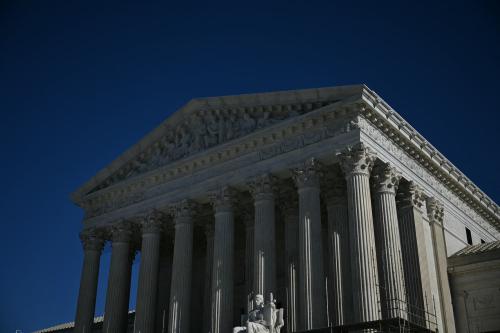Content from the Brookings Doha Center is now archived. In September 2021, after 14 years of impactful partnership, Brookings and the Brookings Doha Center announced that they were ending their affiliation. The Brookings Doha Center is now the Middle East Council on Global Affairs, a separate public policy institution based in Qatar.
Many Americans — and many Egyptians — are souring on the Muslim Brotherhood. Some are rather smugly saying, “I told you so.” From the American and Arab liberal perspectives, the Brotherhood seems run by hyper-charged Islamists bent on imposing their will on the Egyptian people. Like most things in politics, though, it depends on what exactly you’re comparing them to. More than two years into the Arab revolts, Islamists are weighing the virtues of moving more aggressively to implement their agenda versus the benefits of proceeding cautiously in an attempt to placate their critics and opponents.
There is little doubt that the Brotherhood has veered to the right. The real debate within the group is whether they’ve veered far enough. With Egypt as polarized as ever, the Brotherhood has effectively given up on reaching out to liberals and leftists, focusing instead on closing ranks and rallying its base. During the presidential race, Khairat al-Shater, the Brotherhood’s original candidate, chose a Salafi-leaning council of scholars for his first campaign event, where he affirmed that the application of sharia law was his ultimate goal and that he would form a committee of scholars to help parliament achieve that goal. After Shater’s disqualification, Mohammed Morsi — a weaker, less convincing candidate — doubled down on Shater’s back-to-basics message. “Needless to say,” Morsi said, “[I am] currently the only contender who offers a clearly Islamic project.”
After winning the presidency, Morsi took a brief stab at rising above his partisan origins. But the tragic events of Dec. 4, when anti-Brotherhood protesters and government supporters clashed outside the presidential palace, rendered such efforts moot. The violence of that night — provoked by the Brotherhood when it called on supporters to confront protesters — claimed “martyrs” on both sides. For many in the opposition, this was the point of no return — blood had been spilled.
The Brookings Institution is committed to quality, independence, and impact.
We are supported by a diverse array of funders. In line with our values and policies, each Brookings publication represents the sole views of its author(s).



Commentary
Morsi and the Muslims
May 8, 2013